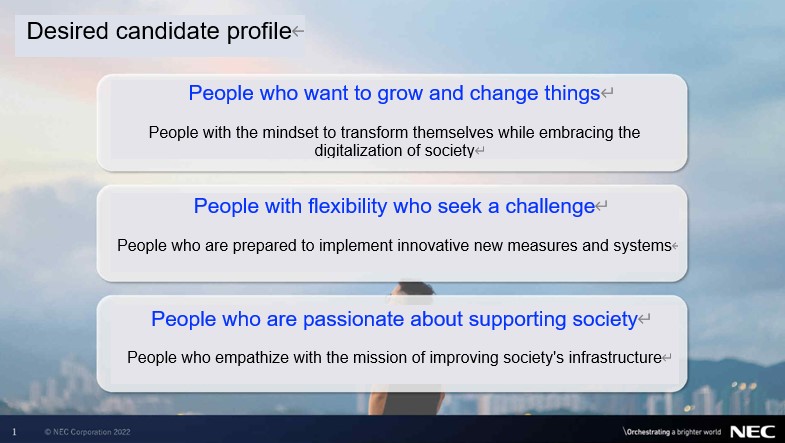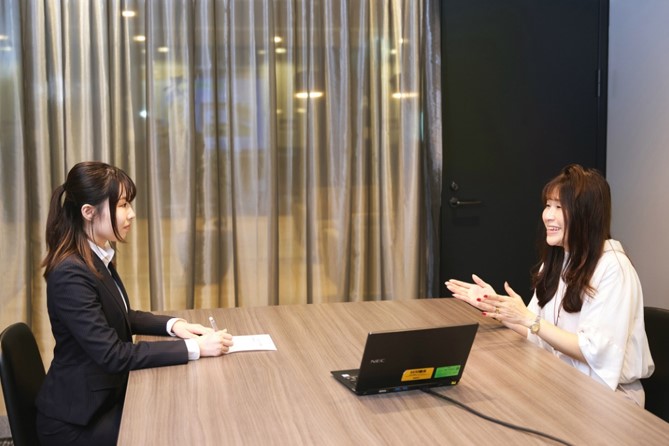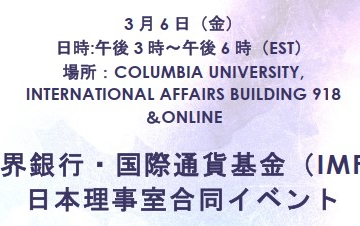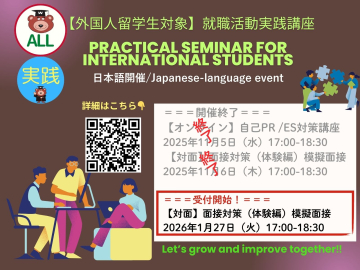Looking for “Passionate People Who Seek a Challenge”
Regarding job hunting, what kind of talent are recruiting companies looking for in students? Also, what are the new employees’ impressions of their company? Many students are probably wondering about that. This time, a Waseda Weekly student reporter of the SJC went to interview an HR manager at NEC and one of their young employees.
NEC is one of the major electronics manufacturing companies, and it operates many businesses using network solutions. It is a really popular candidate for employment among Waseda students. Saya Tanabe (second year at the School of Culture, Media, and Society) is an SJC student staffer. She learned about the ease of working at NEC and the profile of talent they are looking for, and it looks like she realized that what is important during job-hunting is to know what her strengths are.
NEC Corporation
Rie Hoshino
Manager at the Human Resources Development and Training Division (Recruiting group)
Risa Yanagida
First Integration Group at the First Retail Solution Supervisory Division (graduated from the School of Culture, Media, and Society in 2020)
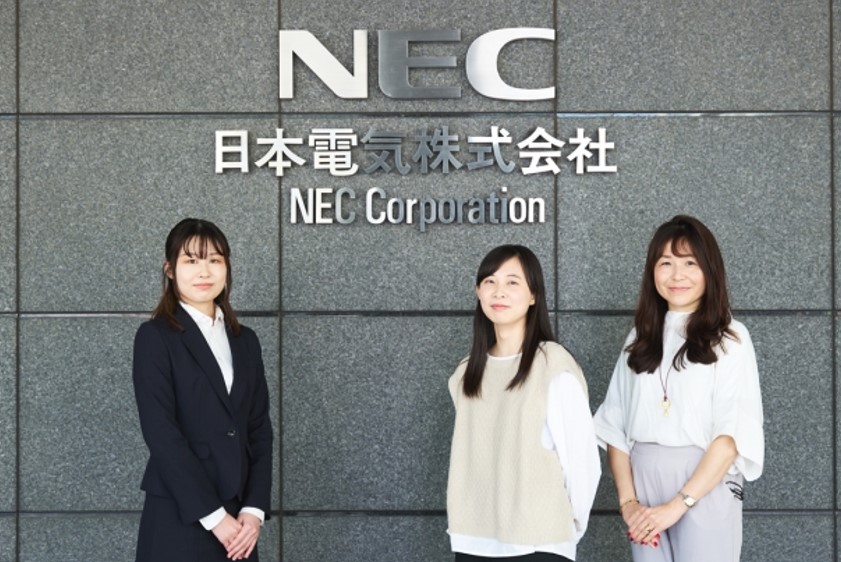
(From the left) Tanabe, Yanagida, Hoshino at the NEC Head Office Building.
Creating a Diverse Workstyle Environment
Tanabe: Many Waseda students are familiar with the NEC company name, but please tell us what kind of business you are doing.
Hoshino: We give three characteristics of NEC when introducing the corporation at company information sessions and such. The first is the “Extensive business reach.” For example, NEC is doing business in a variety of fields, from submarine cables used to transfer data overseas, or media platforms such as YouTube, which everyone watches, to artificial satellites like the Hayabusa spacecraft.
Of course, you cannot call just having a “broad” range of business a strength. The key is our second characteristic, which is to hold many “world-leading advanced technologies.” NEC is operating in a wide range of business areas while being backed by its technology.
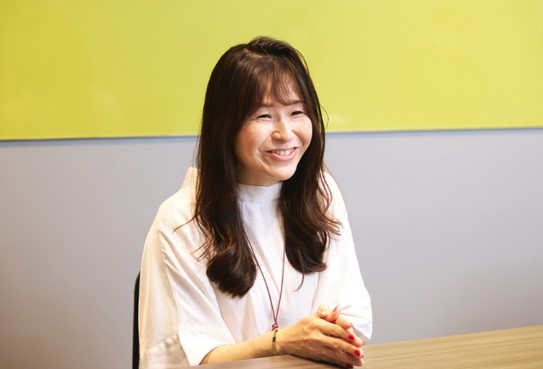
The third is the message “NEC, For Those Who Seek a Challenge.” The corporation has a history of over 120 years, and as such may carry an image of being an “old and conservative company.” But in reality, despite being an old company, it has a disposition for venture businesses, and a corporate culture that supports those seeking a challenge.
NEC considers diversity to be important and, as such, implements a job-matching recruitment policy for new graduates that are up to the challenge for any job, regardless of their academic background. It is a company that cherishes the chemical reactions that occur through diversity.
Tanabe: I’ve heard that NEC values a good work-life balance. Do you have any concrete systems implemented company-wide?
Hoshino: We are trying to be a company where employees can work free of time, space, or dress code restrictions. First, “Time.” NEC is implementing a “superflex time” without core working hours. There is no rule saying that one must at least work from 9:00 am to 3:00 pm, so employees can set their shifts to match their own lifestyle if, for example, they have to drive their children to school and such, or if they are early birds.
Next, “Space.” Work at NEC can basically be done remotely. Sometimes, people can’t do remote conferences from home because of their family, so we have satellite offices in every region so that employees can choose the remote-working environment that best fits their situation.
Then, because we think it is best to work in the clothes you like, we have a dress-code-free policy.
The NEC head office is equipped with facilities like the co-working space called “BASE” and the co-creation space called “FIELD” that employees use as a cafeteria, all to provide a comfortable and pleasant work environment.
Remote working has its flaws, it is hard to turn work on and off, so there is a lot of overtime, and it is difficult to communicate as a team. NEC remedies this by ensuring a freedom of “time,” “space,” and “dress code,” aiming to be a company where it is pleasant to work. And of course, the response from the employees is great!
Also, there is a “Brothers & Sisters System” in which veteran employees in the same department will guide the young ones on the job, and offer mental support, too. NEC has systems in place to fully support its young employees from the start.
Tanabe: Please tell us about future business development or about the vision of what the company is aiming to be. Also, what kind of talent are you looking for?
Hoshino: NEC is looking to focus more on its DX (Digital Transformation) business. I think that DX often comes up, of course, in conversations in the ICT industry, but also in other fields. We want to focus on the DX business using our strengths in the “World-leading advanced technologies” mentioned before that include our biometrics identification technologies and network solutions, among others.
DX will change the world, so we are looking for talent who will be able to adapt to that, focused on three points. First, people who can happily seek challenge in a world never seen before. Second, we think that having the flexibility required to know what clients need, and to be able to be considerate and change the way one thinks during such a time of change, is an important point. Third, people who are inspired and passionate about supporting society through a wide range of projects with an “Extensive business reach.” We want to work with such people.
Tanabe: Do you have a message or advice for students who aspire to work at NEC?
Hoshino: I said earlier that “flexibility” was important, so let me share with you what my superior once told an intern, that “a career shouldn’t be over-decided.“
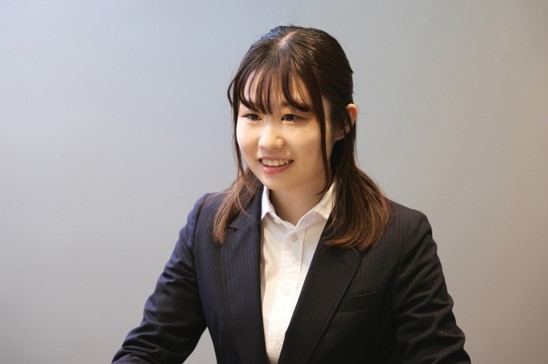
Looking back at my own time as a student, I was overthinking my reasons to apply and where I wanted to be in five or ten years. But people get married, have children, and as your career grows through work, things you want to do and things you can do change all the time.
That superior described a career as a “trip,” saying: “When you are traveling, do you plan everything in detail? Actually, having some loose parts makes the trip more enjoyable, doesn’t it? Just like that trip, a career shouldn’t be over-decided.” I remember how I agreed strongly with that story.
Tanabe: Regarding that “a career shouldn’t be over-decided” point, can you please tell us if there is any company system to broaden one’s career, or broaden the range of possible choices?
Hoshino: NEC has an in-house transfer system called “NEC Growth Careers.” Usually, when people are worrying about their careers, they think about going to work for a different company. But, for people who like the company itself and are attached to it, they can update their resume and transfer to another division within NEC if their profile matches that division’s needs.
I first joined NEC as a system engineer, but during my third or fourth year here I started to feel that there was a gap between what I was thinking about doing when I was in college and what I came to realize on the job, so I transferred to the PR department. This system is used by many others within the company. You can achieve a self-reliant career development by deciding how you want to build it.
The important thing is having the strength and initiative to act when you start worrying about something. Having a corporate culture that welcomes such power is a strong point of NEC. We hope that this will interest you.
Young employees being given responsibilities
Tanabe: Could you tell us your reasons for applying to NEC?
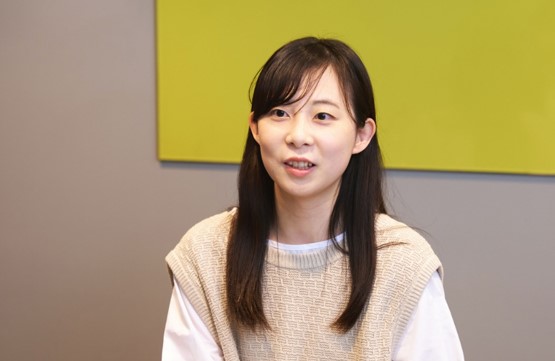
Yanagida: I’m from the School of Culture, Media, and Society, so there was a time I felt that I didn’t really have anything to do with the ICT industry. But, through company information sessions where many corporations participated, I became interested in this industry in which I felt I could experience a lot of things. I applied to NEC because they have a really wide range of business, and the employees with whom I talked during those sessions and the interviews were all really friendly.
Tanabe: Could you tell us about your current job?
Yanagida: I am in charge of sales for major retailers. Retailers are using various systems including a POS system to turn into data the shop’s inventory and sales. Every day, I work with system engineers to sell or repair such systems, and deal with the clients’ requests.
Eventually, I think that I would like to not be attached to a specific client, but instead be in charge of a product that covers all retailers.
Tanabe: What experience as a student are you using now at work?

Yanagida: I wanted to manage systems for retailers because I worked in restaurants when I was a student. I worked in large chain restaurants and privately owned businesses, too, but I was surprised how shifts and daily reports management were handled so differently at different restaurants, even though they were in the same industry, and got interested in how IT could make it much more efficient. I requested an assignment after joining the company, and my request was granted.
Tanabe: What motivates you when working?
Yanagida: I worked in a leader-like role on a project to reform the face recognition system of a major commercial facility. It is a place that I myself often use, so I was able to obtain a sense of accomplishment, that “I did that.“
There are such jobs that can feel familiar, but there are also large projects that we first hear about in technological presentations at work, and they can be really surprising. This is my third year here, but every day I realize that NEC is involved in an almost impossibly wide range of projects.
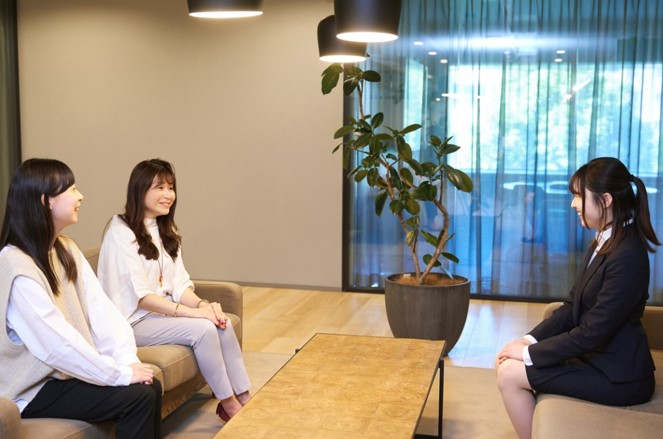
At the BASE coworking space within the NEC head office.
Interview and text: Naoto Oguma (graduated from the School of Humanities and Social Sciences, Evening Program, in 2002)
Photography: Nanako Ono
Approach job-hunting by determining the challenges you want to take
Saya Tanabe, 2nd year at the School of Culture, Media and Society

I learned that NEC expands its business in many fields with the concept of an “Extensive business reach.” They support our daily lives with their main IT business, but also with infrastructure, and I was surprised, yet fascinated, by the rewarding nature of such work.
Also, as recruiting does not depend on academic backgrounds, reassignments are flexible, and employees can work according to their own lifestyles through the implementation of satellite offices and remote working, I felt their willingness to create a pleasant work environment. And that is why I thought it was a company where one could fully demonstrate their talent.
This time, listening to NEC employees talk, I realized that it is important to understand my strengths and what I want to do, and clarify the reasons why I want to work. I think I will look at job-hunting by focusing on myself as an axis to clarify my vision for the future.
*Foreign students need to be proficient at business-level Japanese when joining the company if recruited to work in Japan.
※Read the original report(made in December of 2022) in Japanese from HERE!

